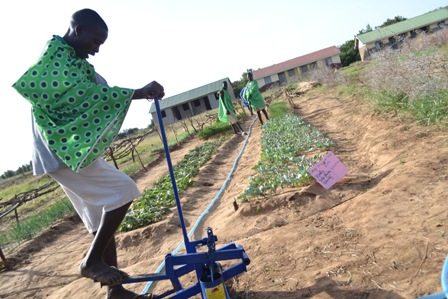FAO junior farmer field schools give voice to children in Uganda

Junior Farmer Field and Life Schools (JFFLS) are a simple methodology for teaching vulnerable children and young people about farming, entrepreneurial skills and how to take care of themselves. These schools follow a “living classroom” approach in which the students observe the crops throughout the growing season. They attend one to two sessions per week in the field and are encouraged to embrace what they learn during class and apply to their own crops.
In Karamoja, Uganda, FAO Junior Farmer Field and Life Schools have increased enrollment, performance and attendance in primary schools that benefit from the programme. To date, there are 49 JFFLS implemented by FAO with funds from the Government of Norway in the districts of Kaabong and Kotido with 1,470 students attending. The objective is to empower vulnerable children to have better futures and improve their livelihoods and long-term food security.
Mr. Kalyanto Benson, the Headteacher of Panyangara Primary School in Kotido district, says that 40 pupils found their way back to his school in 2012 and 2013 thanks to the JFFLS.
 “In addition, attendance, especially by vulnerable children, has significantly improved, leading to better performance. Last year, some of the topics covered in the JFFLS appeared in the Primary Leaving Examinations (PLE). It was exciting for the children”, Kalyanto said.
“In addition, attendance, especially by vulnerable children, has significantly improved, leading to better performance. Last year, some of the topics covered in the JFFLS appeared in the Primary Leaving Examinations (PLE). It was exciting for the children”, Kalyanto said.
Agricultural topics are complemented by life skill sets that teach children not only how to protect their plants but also how to protect themselves from diseases and other adverse conditions.
Panyangara Primary School is running three JFFLS attended by 150 of the 700 pupils in the school. Students benefiting for the JFFLS are vulnerable children who have been orphaned due to HIV/AIDS or other chronic diseases, conflict or gender based violence. Others come from households that are headed by severely disabled parents. The majority of these children live with elderly grandparents or guardians.
In Karamoja, the biggest threat to children is conflict. “Most of the children lost their parents in cattle raids”, explains Kalyanto. Given such a hostile environment, a development intervention that blends it’s activities with the social realities that nurture bitterness and hostility, in many ways, helps mitigate such vices.
 Joseph Egabu, FAO’s Programme Officer in Kotido says that “such children are growing up without learning farming and other survival skills from their parents; skills that could help them earn a living or avoid risky behaviors that might increase their vulnerability and food insecurity”. In addition to experiencing trauma, vulnerable children are more likely to be at risk of malnutrition, disease, abuse, stigmatization, and sexual exploitation.
Joseph Egabu, FAO’s Programme Officer in Kotido says that “such children are growing up without learning farming and other survival skills from their parents; skills that could help them earn a living or avoid risky behaviors that might increase their vulnerability and food insecurity”. In addition to experiencing trauma, vulnerable children are more likely to be at risk of malnutrition, disease, abuse, stigmatization, and sexual exploitation.
The JFFLS in Lopuyo Primary School, also in Kotido district, is famous in the Sub County. Thanks to a simple irrigation system that uses a treadle pump and drip system, they grow a variety of vegetables throughout the year. The knowledge and skills acquired by the young girls and boys also help them develop positive values regarding gender equality and human rights.
Aketch Dorothy, the JFFLS facilitator in Lopuyo Primary School, says the programme has taught children how to interact with the opposite sex. The children have also learned how to channel problems that they encounter such as sexual harassment and defilement. “They report cases to me or other teachers or even local leaders. This has significantly reduced cases of sexual harassment and defilement in the community”, Aketch adds.
